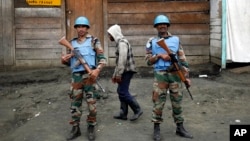United Nations officials have confirmed that the U.N. mission in the Democratic Republic of Congo, known as MONUSCO, has in the past worked with Congolese army officers who were suspected of committing human rights violations.
After addressing a U.N. Security Council meeting Thursday in New York, MONUSCO chief Martin Kobler told the media that this collaboration happened too often, adding that the mission had previously waived U.N. rules "too generously" to be able to work alongside Congolese army officers suspected of violations.
Kobler also said that among those Congolese officers were two generals that the mission decided in February it could not support, because of the U.N.’s human rights policy. Because of that decision, MONUSCO has not taken part in a major offensive led by those generals against Rwandan FDLR rebels.
On Friday in Goma, Daniel Ruiz, head of the MONUSCO bureau, spoke to VOA about his boss’s statement in New York.
“We are always available to work with the Congolese army and we have often worked with units or officers who were suspected of human rights violations," Ruiz said. "One must remember that the DRC had a terrible civil war recently and things like that happen in civil wars.”
Kobler also told journalists in New York that the mission had supported the two generals in the past because it thought the DRC government was taking punitive action against them and had given their cases to the military prosecutor. However, this had not happened in several cases.
He said 118 Congolese army officers are on MONUSCO’s list of suspected human rights abusers and that the mission should not cooperate with them.
But in Goma, MONUSCO's Ruiz said the mission has not ruled out collaborating with officers suspected of human rights violations.
He said the United Nation's general policy in all peacekeeping operations to prevent violations is to take measures to avoid them.
"That doesn’t necessarily mean that we cannot support units that have officers who are suspected of human rights violations," he said. "There are measures that can be taken — for example, human rights officers can be placed close to those units, or military observers, when there are joint operations."
He stressed that there is no blanket ban on collaborating with suspected abusers.
"We mustn’t think that because there’s an officer suspected of human rights violations that we can’t work with his unit," Ruiz added.
He said it depends on the circumstances, on the case, and on the measures taken by the government and by the U.N.
Congo watchers say there has been disagreement within MONUSCO on this issue, an observation Ruiz confirmed.
"I sometimes disagree with Mr. Kobler," he said, "but he’s my boss, so I do what he tells me even if I don’t always agree."
In a similar way, he said, there have sometimes been disagreements between the DRC government and MONUSCO, but there has never been a breakdown in their relations.




